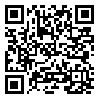BibTeX | RIS | EndNote | Medlars | ProCite | Reference Manager | RefWorks
Send citation to:
URL: http://ijpcp.iums.ac.ir/article-1-1887-en.html
2- Shahid Bahonar University of Kerman, Kerman, Iran
3- Isfahan University, Isfahan, Iran.
Objectives: The aim of this research was to introduce the Persian version of Motor Observation Questionnaire for Teachers (PMOQ-T), and evaluate its reliability and several aspects of its validity in identifying children at risk of developmental coordination disorder (DCD) in Iran. Method: We examined discriminante validity, construct validity, concurrent validity, and internal consistency of the PMOQ-T using a sample of 505 school boys and their teachers. Teachers were asked to complete the PMOQ-T. Teachers assessments were compared to students’ performance on the Bruininks-Oseretsky Test of Motor Proficiency (BOTMP) and Test of Gross Motor Development-2 (TGMD-2). Results: PMOQ-T had a high internal consistency (Coronbach's alpha=0.91). The DCD at risk group scored significantly higher than the normal children in both BOTMP and TGMD-2. Explanatory factor analysis showed that the PMOQ-T was bi-factorial and the Persian version was compatible with the original. Finally, high correlations were observed between the PMOQ-T scores and "BOTMP (-0.75) and TGMD-2 subscales": locomotion (-0.68) and object control (-0.62). Conclusion: The results imply that the PMOQ-T can be considered a valid and reliable screening tool for Iranian children at risk of DCD.
Received: 2013/03/26 | Accepted: 2013/04/16 | Published: 2013/04/16
| Rights and permissions | |
 |
This work is licensed under a Creative Commons Attribution-NonCommercial 4.0 International License. |



